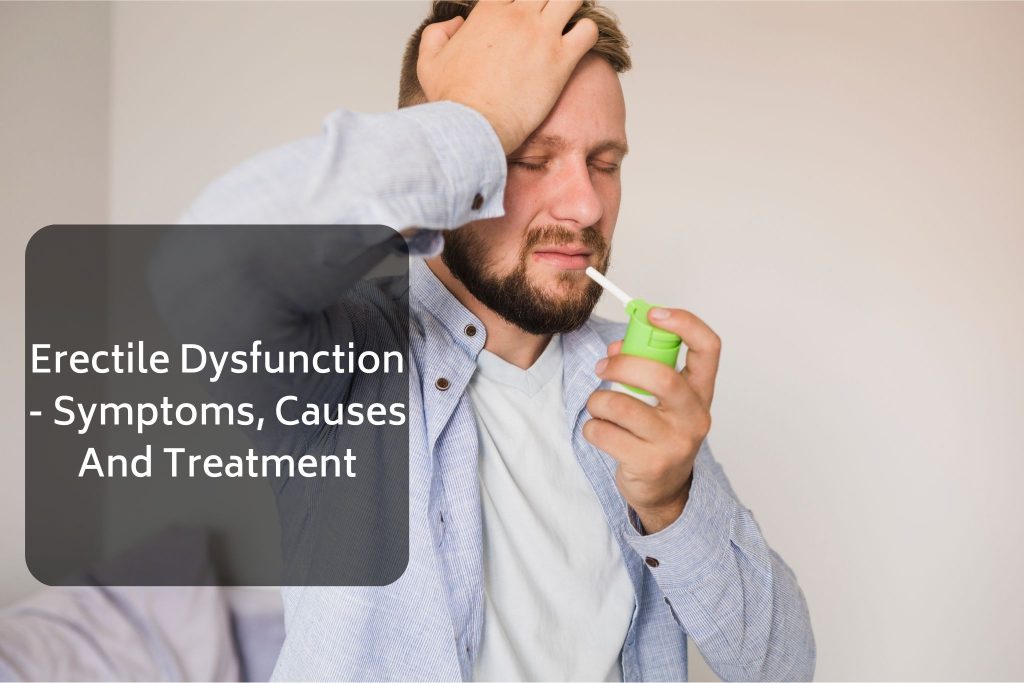
Erectile dysfunction (ED) is a common condition affecting many men worldwide. It can have a significant impact on self-esteem, relationships, and overall quality of life. Understanding the symptoms, causes, and available treatments is crucial for managing this condition effectively.
1. Understanding Erectile Dysfunction
What is Erectile Dysfunction?
Erectile dysfunction is the inability to achieve or maintain an erection sufficient for satisfactory sexual performance. It can occur occasionally or be a persistent problem.
Prevalence
ED is more common than many might think, particularly among older men. However, it can affect men of all ages and can be caused by various factors.
2. Symptoms of Erectile Dysfunction
Primary Symptoms
- Difficulty Achieving an Erection: Struggling to get an erection, even when sexually aroused.
- Difficulty Maintaining an Erection: Inability to keep an erection firm enough for sexual intercourse.
- Reduced Sexual Desire: A noticeable decrease in interest in sexual activity.
Associated Symptoms
- Anxiety: Feeling anxious about sexual performance can both be a cause and a result of ED.
- Low Self-Esteem: Persistent erectile problems can lead to feelings of inadequacy and low self-worth.
3. Causes of Erectile Dysfunction
Physical Causes
- Cardiovascular Diseases: Conditions like atherosclerosis (clogged blood vessels) can reduce blood flow to the penis.
- Diabetes: High blood sugar levels can damage blood vessels and nerves that control erection.
- Obesity: Excess weight can contribute to hormonal changes and cardiovascular issues.
- Hormonal Imbalances: Low testosterone levels can impact sexual function.
- Medications: Some drugs, including antidepressants and blood pressure medications, can cause ED as a side effect.
- Smoking and Alcohol: Both can damage blood vessels and reduce blood flow to the penis.
Psychological Causes
- Stress: High levels of stress can interfere with sexual arousal.
- Anxiety and Depression: Mental health conditions can negatively affect sexual desire and function.
- Relationship Issues: Problems with a partner can lead to ED due to emotional and psychological stress.
4. Diagnosis of Erectile Dysfunction
Medical History and Physical Examination
A thorough medical history and physical examination are essential for diagnosing ED. This helps identify underlying health conditions or lifestyle factors contributing to the problem.
Diagnostic Tests
- Blood Tests: To check for conditions like diabetes, heart disease, or low testosterone.
- Urinalysis: To look for signs of diabetes or other underlying health conditions.
- Ultrasound: To examine blood flow to the penis.
- Psychological Examination: To identify any psychological factors that may be contributing to ED.
5. Treatment Options for Erectile Dysfunction
Lifestyle Changes
- Exercise: Regular physical activity can improve blood flow and reduce ED symptoms.
- Healthy Diet: Eating a balanced diet can help maintain a healthy weight and reduce the risk of conditions that cause ED.
- Quit Smoking and Limit Alcohol: Reducing or eliminating these can improve ED.
Medications
- Oral Medications: Drugs like sildenafil (Viagra), tadalafil (Cialis), and vardenafil (Levitra) are commonly prescribed to treat ED.
- Hormone Therapy: Testosterone replacement therapy can be effective for men with low testosterone levels.
- Injection Therapy: Medications injected directly into the penis can cause an erection.
Medical Devices
- Vacuum Erection Devices: These devices use a pump to create a vacuum around the penis, drawing blood into it to induce an erection.
- Penile Implants: Surgical implants can be an option when other treatments have failed.
Psychological Counselling
- Therapy: Working with a therapist can help address psychological causes of ED, such as anxiety, depression, or relationship issues.
- Couples Counselling: This can help address any relationship issues contributing to ED.
6. Preventing Erectile Dysfunction
Regular Check-Ups
Regular medical check-ups can help detect and manage underlying health conditions that may cause ED.
Healthy Lifestyle
Maintaining a healthy lifestyle through diet, exercise, and avoiding harmful habits can reduce the risk of developing ED.
Mental Health
Taking care of your mental health is equally important. Managing stress, anxiety, and depression can help prevent ED.
Conclusion
Erectile dysfunction is a common condition with various causes and effective treatments available. Understanding the symptoms, underlying causes, and treatment options can help men take proactive steps to manage ED and improve their quality of life. If you or someone you know is experiencing symptoms of ED, seeking professional medical advice is the first step towards effective management and treatment.
